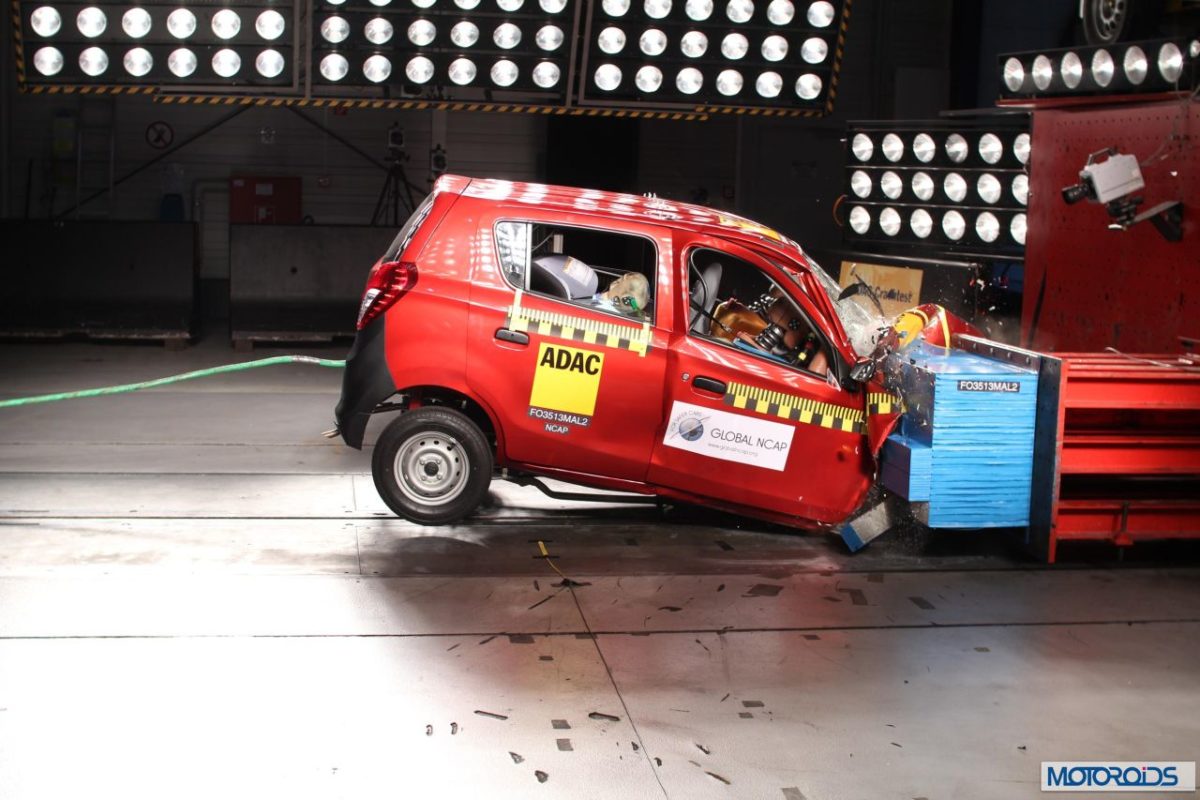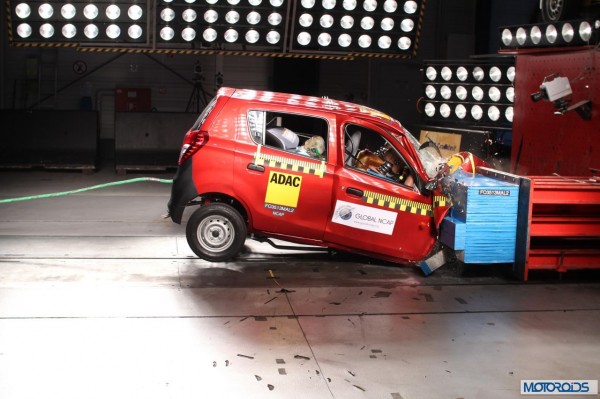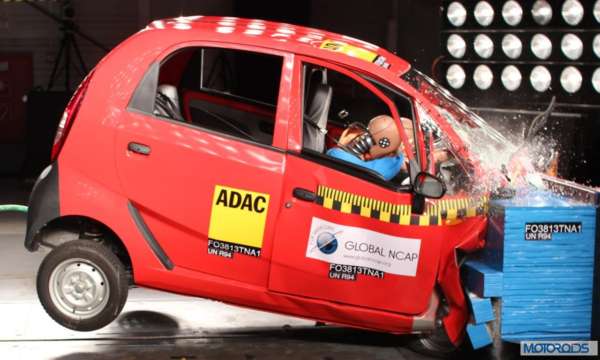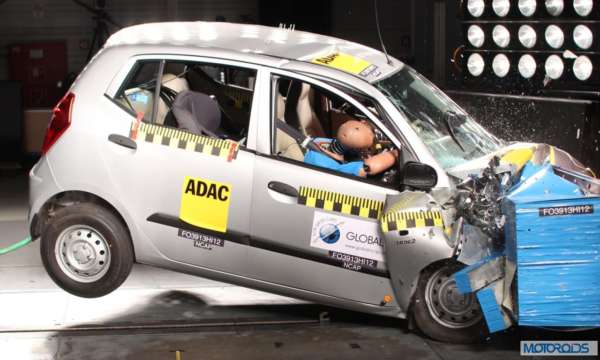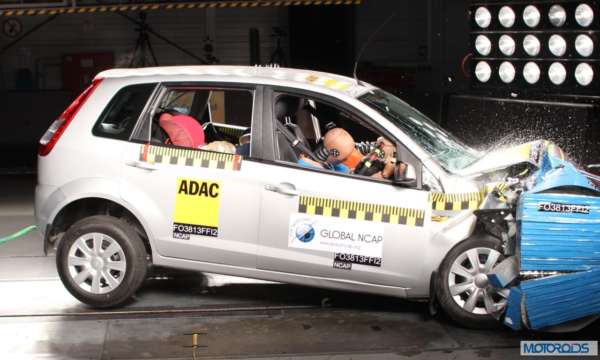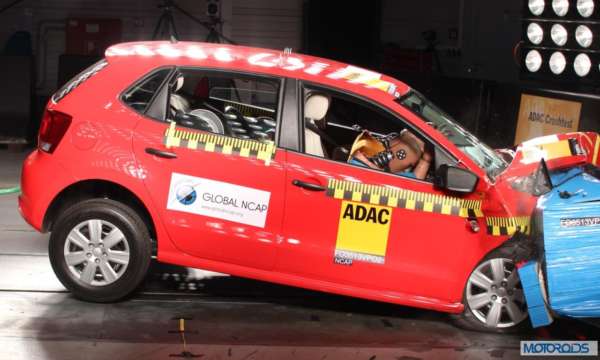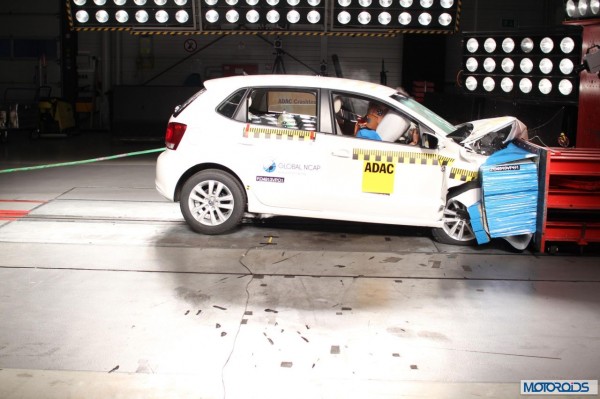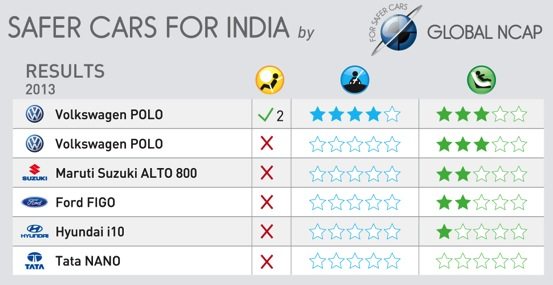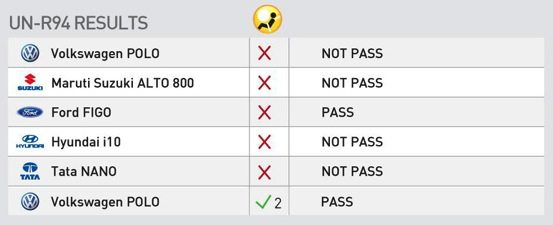In a one of its kind, first-ever, independent crash test of some of India’s small cars have emerged as unsafe. Almost all the cars have shown a high-risk of life threatening injuries in road crashes. The cars selected by Global NCAP for testing in a frontal impact at 64km/h received a shocking ZERO STAR adult protection rating.
The crash test was performed on the following models
It’s interesting to note that the combined sales of these five cars accounted for around 20% of all the new cars sold in India last year. This puts a substantial chunk of Indian car drivers at a major risk of fatal injury during an accident. Global NCAP chose the entry-level version of each model and as a result none were fitted with airbags as standard. The results highlight major differences in the structural integrity of the vehicles tested.
Comments on individual vehicles’ adult protection are as follows
Suzuki-Maruti Alto 800
- In the 64km/h NCAP test, the Suzuki-Maruti Alto 800 achieved a zero-star rating for its adult occupant protection. The vehicle structure was rated as unstable, increasing the risk of life-threatening injuries and making the car unsuitable for the fitment of airbags.
- Using the child seats recommended by Suzuki-Maruti, the Alto 800 achieved a two-star rating for child protection.
- The Alto 800 was not able to meet the UN’s minimum safety requirements in the 56km/h crash test.
Tata Nano
- In the 64km/h NCAP test, the Tata Nano achieved zero stars rating for its adult occupant protection. The vehicle structure was rated as unstable, increasing the risk of life-threatening injuries and making the car unsuitable for the fitment of airbags.
- The car achieved a zero-star rating for its child protection as it was not possible to install child seats in the car.
- The Nano was not able to meet the UN’s minimum safety requirements in the 56km/h crash test.
Hyundai i10
- In the 64km/h NCAP test, the Hyundai i10 achieved a zero-star rating for its adult occupant protection. The vehicle structure was rated as unstable, increasing the risk of life-threatening injuries.
- Using the child seats recommended by Hyundai, the i10 achieved a one-star rating for child protection. The three year-old dummy indicated a high risk of serious injury.
- The i10 was not able to meet the UN’s minimum safety requirements in the 56km/h crash test.
Ford Figo
- In the 64km/h NCAP test, the Ford Figo achieved a zero-star rating for its adult occupant protection. The vehicle structure was rated as stable, but without safety equipment such as airbags, too much of the crash energy was absorbed directly by the occupants.
- Using the child seats recommended by Ford, the car achieved a two-star rating for its child protection.
- The Figo was able to meet the UN’s minimum safety requirements in the 56km/h crash test as the driver’s head narrowly avoided direct contact with the steering wheel.
Volkswagen Polo
- In the 64km/h NCAP test, the Volkswagen Polo without airbags achieved a zero-star rating for its adult occupant protection. The vehicle structure was stable, but without safety equipment such as airbags, dummy readings indicated a high risk of life-threatening injuries.
- With two airbags (driver and front passenger), the Volkswagen Polo achieved a four-star rating for adult occupant protection in the 64km/h NCAP test. Thanks to the airbags, the protection offered to the driver and passenger head and neck was good.
- Using the child seats recommended by Volkswagen, the Polo achieved a three-star rating for child protection.
- Without airbags, the Polo was not able to meet the UN’s minimum safety requirements in the 56km/h crash test.
- Global NCAP advises consumers to check carefully which version of the Polo they buy.
Coinciding with the Global NCAP tests, Volkswagen has decided to withdraw the non-airbag version of the Polo from sale in India, as we reported a while back. Because of this, Global NCAP agreed to a request from VW to assess a version of the Polo that has two airbags fitted as standard as from now. Other manufacturers had the same opportunity. The protection proved much better and this airbag-equipped model received a four-star rating for adult occupant protection.
Models also fail to pass UN’s basic safety test
Global NCAP also assessed the same models against the UN’s basic crash test. This 40% offset frontal impact test at 56km/h is now widely applied by major manufacturing countries and regions, including Australia, China, European Union, Japan and Malaysia. The Global Plan for the UN’s Decade of Action for Road Safety recommends that all Member States apply this standard, although it is not yet applied in India. All but one of the cars tested failed to pass even this minimum standard.
It’s notable here that :
- Ford Figo passed despite not having a driver airbag when the dummy’s head narrowly avoided hitting the steering wheel directly
- Volkswagen Polo with two airbags was awarded a pass based on dummy readings from the 64km/h crash
Global NCAP has awarded a separate child safety rating to each car in order to highlight the different levels of protection vehicles provide to passengers on the rear seats. Because the only safe way for young children to travel is properly restrained in a child seat, the assessment checks how compatible the car is with the child seats recommended by the manufacturer, as well as the protection provided in the crash.
In the assessments, the child seats recommended by manufacturers were often found to be incompatible with their vehicle’s belt system. In the Tata Nano, there was no three-point seatbelt on the rear seats and no way to install a child seat or transport a small child safely.
Also Read: Audi Q Drive 2014 to be organized in More Than 30 Cities
Max Mosley, Chairman of Global NCAP, said: “India is now a major global market and production centre for small cars, so it’s worrying to see levels of safety that are 20 years behind the five-star standards now common in Europe and North America. Poor structural integrity and the absence of airbags are putting the lives of Indian consumers at risk. They have a right to know how safe their vehicles are and to expect the same basic levels of safety as standard as customers in other part of the world.”
Also Read: New Nissan Micra Limited Edition launched in UK
Rohit Baluja, President of India’s Institute of Road Traffic Education (IRTE) said: “These results show that India would benefit enormously from the introduction of minimum crash safety standards and clearer information for consumers about the protection new cars offer. Many cars made in India for export meet these standards already, so it’s not a question of know-how or capability: India’s automobile industry just needs the right incentives. With the UN’s minimum safety standards and clear information for consumers, India can produce cars that are every bit as good as those in Europe and the US.”

